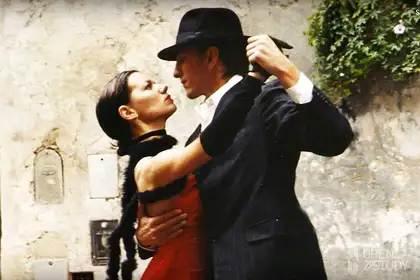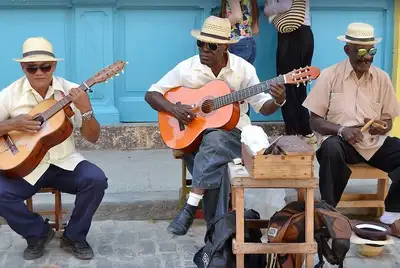
The tango reflects the losses and longings of migrants from Europe to Argentina
It’s famously seen as a melancholic, darkly passionate dance of Argentina, but tango is also a story of migration and social upheaval. It is one of four music styles explored in the first free online course from the Spanish Language Programme at Massey University’s School of Humanities.
In the new four-week course, which starts this week, Latin American Music: Translating Cultural Sensibilities explores how particular musical genres embody historical, political and social changes and characteristics of Latin America. The course focuses on tango, salsa, bolero and trova as platforms for understanding Latin American people, their histories and social issues.
The boutique course is offered via the Open Universities Australia Open2Study platform, and based on specially devised video material created by Dr Leonel Alvarado and Dr Celina Bortolotto, who teach in Massey’s Spanish Language Programme. They collaborated with Massey Worldwide to produce the programme, created as a stand-alone interest paper and pathway into more intensive language study.
Take tango – with its distinctively sad, haunting melodies. It is based on the music of African slaves and has Parisian roots, expressing the longings and hopes of 19th century European migrants to Argentina. Salsa captures the musical evolution and social movements from the Caribbean to the United States, says Dr Alvarado. He also teaches a level three undergraduate paper: Latin American Rhythms and Politics: From Tango to Rock. Other musical styles covered in the free online course are bolero and trova – and how the poetry of their lyrics is an expression of political and protest movements and ideas across Latino cultures and nations.
The course will include translations of song lyrics as a way to understand the influences and perspectives of Latino artists and how their work embodies a richness of cultural knowledge and traditions, he says. Original video material also includes interviews with Latin American artists, such as Panamanian singer-songwriter Rómulo Castro, who visited New Zealand earlier this year for a three-week cultural tour organised by the Spanish Programme.
"We also look closely at song lyrics to discover the difficulties and rewards of attempting to translate not only languages but also cultural experiences, prompting reflections on the differences and similarities across peoples," says Dr Bortolotto.

Musical genres, like salsa, bolero and trova, express the history and social developments of Latin American cultures.
Online free courses a taster for future study
Like other free online courses, the short course is designed as a study appetiser for people keen to begin or continue learning in an area of interest but who have limited time. They may be motivated to do so as a career booster, for leisure or as a first step towards further learning, says Hani Banna, the head of Open2Study.
There are no assignments or exams. Course content is confined to videos, with a follow-up reading list for those who want to explore the subject in more depth, and quizzes at the end of each week on the material presented in the video. There is also an online forum for participants who want to discuss the topic or share their interest in it with fellow students.
The Spanish course is the first MOOC (Massive Open Online Course) for the School of Humanities, although the Spanish Language programme – created specifically by Dr Alvarado and his colleagues at Massey for Australasian learners – has been delivered online to the University of New England, New South Wales, Australia, since 2012.
Spanish is one of four languages offered through Massey’s School of Humanities, with French, Chinese and Japanese also available. Learning a second language is considered an increasingly important workplace skill in New Zealand’s more culturally diverse, globalised workforce, as well as for the cultural, trade, educational and travel opportunities, says Associate Professor Kerry Taylor, Head of the School of Humanities.
Short online courses have been offered by Massey through Open2Study since 2013, and include programmes on emergency management; agriculture; and indigenous studies: Australia and New Zealand. Students from 195 countries enrol in Open2Study courses, with the majority in Australia and the United States aged between 24 and 35, and with six per cent from New Zealand.